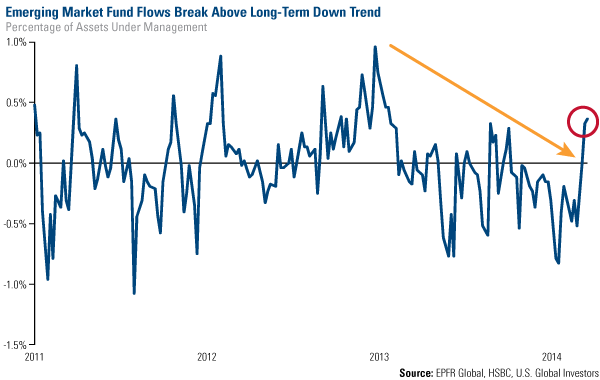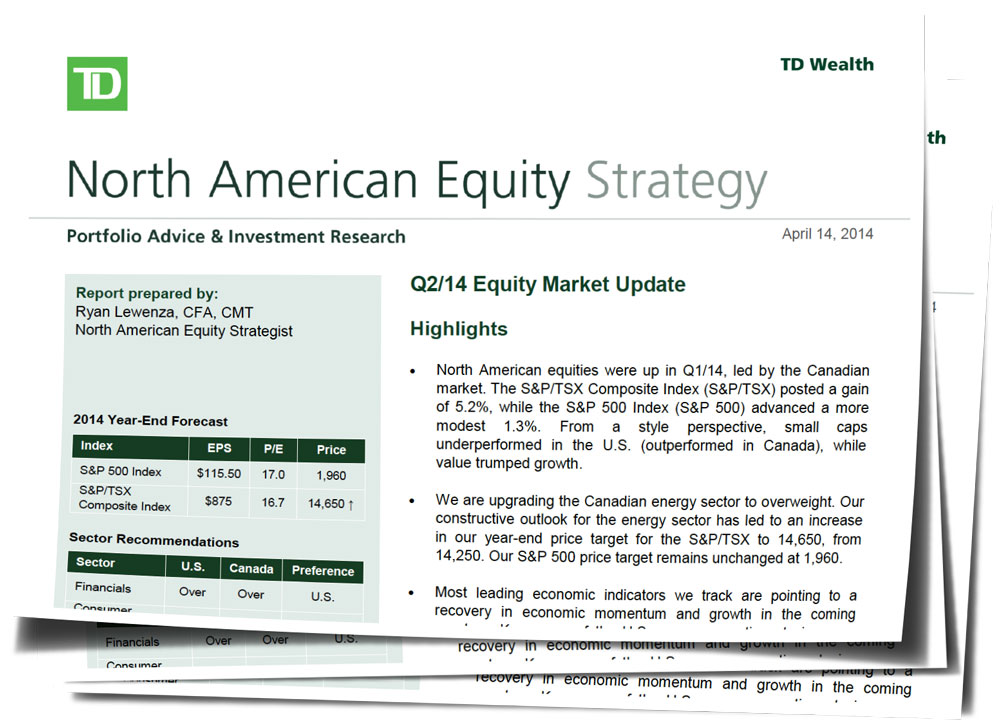Emerging Markets Radar (April 14, 2014)
Strengths
- Emerging market equity funds recorded the highest inflows in more than 14 months, with a substantial portion of the funds going to broad-mandate emerging market funds. Europe, Middle East and Africa (EMEA) equity funds also saw an acceleration of inflows. The momentum of fund flows has continued to improve since mid-March after hitting a bottom in early February.
- The recovery in Czech industrial production sped up in February with output rising 6.7 percent following January’s rise of 5.7 percent. Perhaps more encouraging for the future months is the strengthening of order books, which stood 19.9 percent higher than this time last year. Similarly, in February, Hungary's industrial production growth unexpectedly accelerated to its fastest rate in three years, rising 8.1 percent year-on-year, following a growth of 6.1 percent in January.
- In February, seasonally-adjusted exports in the Philippines rose 8.8 percent month-over-month, a significant recovery from the 5 percent month-over-month decline in January. This recovery was driven by electronics exports to Japan, as Japanese consumers rushed to buy ahead of the April hike in the value-added tax.
Weaknesses
- According to Brazil’s national statistics office, March inflation showed material deterioration as consumer prices rose at a monthly rate of 0.92 percent in February. The reading missed the market’s consensus of 0.85 percent. Annually, the reading accelerated from 5.68 percent to 6.15 percent. According to HSBC, food inflation contributed to half of the total increase, as the drought has impacted food prices. Nonetheless, additional signs of deterioration make the inflation outlook quite challenging.
- The Czech trade surplus unexpectedly declined in February and came in below economists' expectations. The foreign trade surplus dropped to CZK 13.63 billion ($0.69 billion) from CZK 16.48 billion a year ago, as exports couldn’t keep up with the rapid growth in imports. Economists forecasted a surplus of $1.06 billion.
- China’s producer price index (PPI) declined 2.3 percent year-over-year in March, a twenty-fifth consecutive month of contraction and the longest deflationary stretch since 1997. This highlights weak domestic demand and continued erosion of pricing power for the manufacturing complex.
Opportunities
- Emerging market stocks advanced to a five-month high as the Federal Reserve minutes eased concerns about the pace of an increase in U.S. interest-rates. Several Fed policymakers said the median projection for interest-rate hikes exaggerated the likely speed of tightening. The MSCI Emerging Markets Index has underperformed the U.S. market by as much as 16 percent since May 22, when the Fed signaled that stimulus could be trimmed. The Fed minutes, together with the recent strength in emerging markets, bodes well for a closing of the underperformance gap.
- In any event, historical data over the past 25 years shows that U.S. monetary tightening cycles were typically associated with outperformance of emerging market equities versus their developed counterparts. Lingering market concerns over sooner-than-expected interest rate hikes under Janet Yellen could bode well for emerging markets going forward.
- Greece ended a four-year exile from international markets with a bond sale of 3 billion euros ($4.2 billion), with nearly 90 percent of the issue going to investors outside of Greece. The country had orders exceeding 20 billion euros, as international markets are now expressing their confidence in the country’s economy. This regional strength extends to Turkey, which announced on Tuesday its plans to issue a euro-denominated bond to cover remaining external financing needs for the year. The Turkish government is seeking to take advantage of sharply improved investor sentiment towards the country.
Threats
- Russian companies listed on foreign stock exchanges should consider delisting their shares overseas and instead trade in Moscow, according to First Deputy Prime Minister Igor Shuvalov. The Minister claimed that the Moscow Exchange provided additional security amid foreign sanctions on Russian entities over Crimea. However, with foreign investors holding 70 percent of Russia’s stock free-float, a move away from Western markets would result in a further sell-off.
- Russia’s biggest metal and mining companies are seeking about $5 billion of loans with international banks since the annexation of Crimea last month cut off bond markets. The situation has become critical for some borrowers, which are in the process of negotiating breather periods with lenders. This should give the loss-making firms time to hammer out revised terms for multi-billion dollar debt repayments, without the risk of default. The major approvals to amend the terms were granted by Russian banks, largely by request of the government, but to the detriment of the banks’ shareholders.
- Difficult seasonality and three weeks of underperformance from growth-oriented fund managers could mean continued selling pressure on growth stocks, as we witness an ongoing style rotation away from momentum and growth to reversal and value.
















